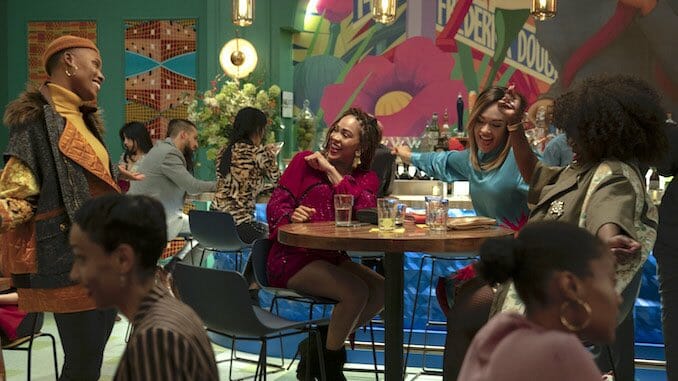Amazon’s Likable Harlem Doesn’t Quite Scratch the Insecure Itch
Photo Courtesy of Amazon Prime Video TV Reviews Harlem
At the end of December, HBO’s hit comedy series Insecure—about young Black people in Los Angeles—will come to an end after five seasons, and its finale leaves a gaping hole for elite personable and relatable storytelling aimed at African American audiences. Enter Harlem, a new show on Amazon Prime Video that, whether intentionally or not, aims to fill that void.
Unfortunately, Harlem isn’t the spiritual successor that it perhaps hopes to be. Similar in structure and from a writing team that has worked on First Wives Club and the hit film Girls Trip, the show follows four women in Harlem as they deal with the rollercoaster of drama of their own personal and professional lives. Camille (Meaghan Good), the show’s central character, is an anthropology professor at Columbia who is desperate for both tenure and a way to get over her ex who is unexpectedly back in town. Tye (Jerrie Johnson) is a queer tech start-up founder whose product is about to make it big, while Quinn (Grace Byers) and Angie (Shoniqua Shandai) are a pair of roommates who have different views on everything from money to men.
There are shades of the Issa Rae-led comedy throughout, and it’s hard not to compare the two shows in premise and execution. If Camille is Harlem’s Issa, she lacks a lot of the personality that was infused in Issa’s one-liners and mirror alter-ego. The show itself is introduced with an aside about Mosuo women (a tribe that Camille has studied) and though thematically the Mosuo women’s independence and status in society is relevant to the series, the tone feels disconnected from what the rest of the episodes are trying to accomplish, and sets an odd tempo from the start.
Quinn, Harlem’s version of Molly, is wealthy and professionally successful (though not as independently as Molly), and perpetually single. Most of her storylines revolve around terrible dates, but Quinn and Molly’s approach to dating couldn’t be more different: where Molly was a skeptic, Quinn dates with hope, even when she shouldn’t. In the first three episodes provided for review (out of a total ten), Quinn’s bad luck with Tinder dates provide a source of comedy, but the laughs are minimal and fleeting.
To that end, Harlem has very few male characters, and the ones it does have aren’t developed. As a show about women and female friendship, this makes sense on a surface level. But a little character development for Camille’s ex or any other past relationships that pop back up would go a long way in ensuring that audiences are getting a rounded story, and are actually invested in how it plays out.
The bright spot is Tye’s queer dating app for people of color and her interrogation of LGBTQ norms within marginalized communities. It’s one of the few hot topics that Issa Rae didn’t infuse into an A-plot in her show, and Harlem’s inclusion of Tye as a mouthpiece for conversations about racialized dating fetishes or dating outside of one’s community provide a space for these conversations to occur. It’s also refreshing to see that Tye is the most independent, successful, and financially secure of the four friends, fully confident in her app and her abilities as a queer woman in the tech space.
“Young people in a city trying to figure out life” is a great genre when executed properly, and when shows are able to make situations both hyper-specific to the setting and universally relatable. Insecure was often lauded for how well it threaded Los Angeles into its DNA, and while Harlem is aiming to do the same thing, it doesn’t do quite enough to fully imbue the show with the charm and grit of its uptown Manhattan neighborhood.
Beyond shots of brownstones and on-location restaurant scenes, it takes quite a few episodes before the show finds a storyline that feels like it belongs squarely in New York City. And when it does, it moves toward a predictable resolution. In Episode 3, Whoopi Goldberg appears as a new faculty member in Camille’s prestigious Columbia department; but instead of mentoring Camille, she holds her at a distance and challenges her to expand her activism beyond just the walls of her classroom—so Camille takes to the streets to protest a new restaurant that is adding to the neighborhood’s gentrification. What should be a moment of triumph ends in a place that audiences could see coming from a mile away.
Still, the characters are fun to hang out with, and the show makes for a quick and enjoyable binge that doesn’t require too much thought. Harlem isn’t as groundbreaking, tight, or fresh as Insecure was, but perhaps the comparison is incorrect—Harlem isn’t trying to be anything other than another show about young, successful Black women thriving. And no matter the packaging, Hollywood needs more of these stories.
Harlem premieres Friday, December 12th on Amazon Prime Video.
Radhika Menon is a pop culture-obsessed writer and filmmaker living in New York City. Her work has appeared in NY Post’s Decider, Teen Vogue, and will be featured in Brown Girl Magazine‘s first ever print anthology. She is a proud alumna of the University of Michigan and thinks she’s funny on Twitter.
For all the latest TV news, reviews, lists and features, follow @Paste_TV.